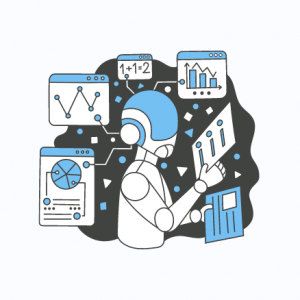In today’s digital age, technology is constantly evolving, pushing the limits of what was previously thought possible. At the forefront of this evolution is machine learning, a revolutionary branch of artificial intelligence that has changed the way we interact with data and make decisions. In this blog, we’ll look at the complexities of machine learning and some of the most prominent applications influencing industries in 2024.
What is Machine Learning?
Machine learning is a subset of artificial intelligence that allows computer systems to learn and improve through experience without being explicitly programmed. Essentially, it allows machines to identify patterns, predict outcomes, and optimise processes by analysing massive amounts of data.
Machine learning’s primary benefit lies in its capacity to unveil insights and patterns. Human analysts often overlook these due to the vastness and complexity of data. Machine learning applications can extract valuable knowledge from datasets using algorithms and statistical models, resulting in more informed decision-making and increased efficiency across multiple domains.
Benefits of Machine Learning
Machine learning applications provide a plethora of benefits, revolutionising industries and driving innovation in unprecedented ways.
- Enhanced Decision Making: Machine learning algorithms process large datasets swiftly. This enables organizations to make data-driven decisions more accurately and efficiently.

- Increased Automation: Machine learning improves operations by automating repetitive tasks and processes, reducing human error and freeing up valuable time and resources for more strategic initiatives.
- Personalisation: Machine learning powers personalized recommendations and experiences across digital platforms. This spans from e-commerce product suggestions to content recommendations on streaming services, enhancing user engagement and satisfaction.
- Improved Efficiency: Machine learning algorithms can optimise processes and workflows, resulting in higher productivity, lower costs, and better resource utilisation.
- Predictive analytics: By analysing historical data and identifying patterns, organisations can forecast trends, anticipate customer behaviour, and reduce risks.
Popular Machine Learning Applications in 2024
In 2024, machine learning continues to revolutionise industries around the world, with applications spanning a variety of sectors.
- Image Recognition: Machine learning algorithms can analyse images and identify objects, faces, and scenes with high accuracy. And thus making them useful in applications such as facial recognition, medical imaging diagnostics, and autonomous vehicles.
- Speech Recognition: Machine learning algorithms enable accurate speech recognition, facilitating hands-free interaction. Voice-activated devices and virtual assistants leverage this technology for natural language processing.
- Recommender Systems: Recommender engines, which provide tailored suggestions based on user behaviour and preferences, are powered by machine learning. These engines increase engagement and revenue in e-commerce, streaming services, and content distribution networks.
- Fraud Detection: Machine learning algorithms analyze transactional data to detect fraudulent activities and anomalous behavior. This assists financial institutions and e-commerce platforms in mitigating risks and safeguarding against fraud.
- Self-Driving Cars: Autonomous vehicles employ machine learning algorithms to perceive surroundings, make real-time decisions, and navigate roads safely. This paves the way for a future of transportation that is both more efficient and safer.
- Medical Diagnosis: Machine learning algorithms are transforming healthcare by enabling early disease detection, personalised treatment plans, and medical image analysis, radically improving patient care and outcomes.
- Stock Market Trading: Machine learning algorithms analyse market data, identify patterns, and forecast trends, allowing traders and financial institutions to make more informed investment decisions and optimise portfolio management strategies.
- Virtual Try-On: Machine learning powers virtual try-on solutions that allow customers to visualise products like clothing, eyewear, and cosmetics. Before making a purchase decision, thereby improving the online shopping experience and reducing returns.
Rhabdom Solution leads in tech innovation, providing tailored software services across industries. Expertise in Artificial Intelligence, Machine Learning, and Software Development, we drive digital transformation for businesses.
Conclusion
Machine learning application represents a paradigm shift in how we use data and technology to drive innovation and open up new opportunities across industries. As we embrace the power of machine learning, we usher in a future brimming with opportunities for growth, efficiency, and transformation.



